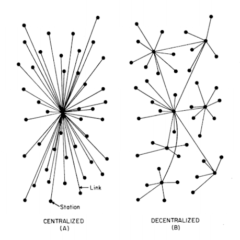Francis Fukuyama, 1992
Francis Fukuyama utilises his 1989 article The End of History as a point of departure for a book-long social history, which overtly acknowledges Hegelianism and Marx’s dialectic to produce an introspective civilizational overview composed of sweeping claims and dramatic irony. He firstly makes a distinction between the real of the material world and the realm of ideas, claiming that with the fall of the Soviet Socialism, Western liberal democracy has supplanted all rivals in the latter field. From this basis, however, he inverts the futurist tone of the project of modernity and adopts a retrospective viewpoint, constructing a causal narrative that points out the inconsistencies in the tropes of other civilizational ideologies and cultures with an explanatory aim. Fukuyama is clearly a Eurocentrist; a difficult position to be in when making such monolithic claims. However, the virtue of his work is in wedding so many diverse fields into a brutally compelling, if awry read. His discussion of thymos is of particular interest to the Plato scholar and political scientists of populism. Thymos is characterised in Plato’s Phadrus as the third element of the soul – after desire and reason – which seeks external recognition. One could link it to Maslow’s notion of self-actualisation, though from my reading, Fukuyama does not. Thymos was applied to Trump adherents, from a reading of Fukuyama, though infelicitously Fukuyama is actually describing the affirmative virtues of the liberal democratic system when outlining the concept.; that very order which Trumpians espoused their opposition to.
In an era of the rise of China Fukuyama’s book is evermore compelling as a testament to the tendency of any ostensibly liberatory ideology to assert itself as the destination for all others. Ideology must universalise itself for legitimation; else it is simply politics. What is more redeemable, however, are the Chapters on work and desire alternatively that broach Weberianism. Casting culture as an explanatory factor for productive differences, he offers up a fantastic example that mirrors the toilet-ideology quip of Žižek.
R. V. Jones, one of the founders of British scientific intelligence in World War II, recounted a story of how the British were able to capture an entire German radar set intact and bring it back to England in the early years of the war. The British had invented radar and were well ahead of the Germans in technology, yet the German machine was surprisingly good because the antenna was machined to tolerances superior to anything that could be produced in England. Germany’s long-standing superiority over its European neighbors in maintaining a tradition of highly skilled industrial craftmanship, still evident in its automobile and machine tool industries, is one of those phenomena that defy explanation in terms of “macro” economic policies. Its ultimate cause would have to be found in the realm of culture.
The Thymotic Origins of Work, p.225
However, the unificatory nature of his project is such that he does not bring many of his speculations to completion; or, at least, to a convincing clarity. His laissez faire attitude to evidential cross-comparison hardly helps. And, he would do better in bringing forth the abundance of originality he clearly presents at times as a discrete collection of ideas, standing in their own right rather than coalescing with the excessively instrumentalist hermeneutics he elaborates.
P R E V I E W

I was excited to uncover this great site. I need to to thank you for your time for this particularly wonderful read!! I definitely enjoyed every part of it and I have you book marked to check out new stuff in your web site.
May I simply say what a comfort to discover somebody who genuinely knows what they are talking about over the internet. You actually understand how to bring a problem to light and make it important. More people ought to check this out and understand this side of the story. I cant believe you arent more popular because you surely possess the gift.